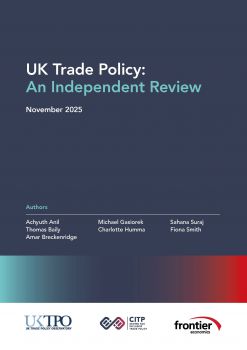Research news
Independent review sets out improvements to UK trade policy
By: Vicky Welstead
Last updated: Friday, 28 November 2025

An independent review published by leading trade experts assesses the making of trade policy in the UK. It examines how trade policy can be improved to address stagnant productivity rates and boost growth while balancing security and other concerns.
Recognising stark international challenges and declining living standards at home, the report makes a series of recommendations to move beyond what it calls a “piecemeal” approach to UK trade policy in recent years, including:
- Stronger parliamentary oversight, consultation processes and evidence-gathering to guide decisions and reinforce the government’s mandate on trade
- A coordinated, cross-government approach to shed light on the trade-offs involved in policy decisions, for example between growth and security, sustainability and inclusion
- Clarifying how economic security fits with commitments to multilateralism, to ensure that emerging security-driven arrangements do not undermine global rules, and account for impacts on developing countries
Today’s review was jointly written by the Centre for Inclusive Trade Policy, Frontier Economics and the UK Trade Policy Observatory at the University of Sussex.
Professor Michael Gasiorek, University of Sussex said:
“The government should be congratulated on having published the first comprehensive Trade Strategy since Brexit, and on the careful balance it is attempting to strike with partners around the world. Yet with limited fiscal headroom and so much riding on growth we need to look at how trade can contribute more to this economic mission, while also serving the country’s wider interests. This demands coherence and consistency in how policies are drawn up.”
Paul Johnson, Frontier Economics said:
“The UK is at a very challenging juncture. Growth is weak, there is a fiscal crunch, and trade barriers with its two largest partners, the EU and the US, are the highest they have been in over 30 years. Trade policy reform can help to find a way out of this situation but needs to be better thought through. This review provides a series of recommendations on how this can be done”
While praising the government for taking significant steps, via its Trade Strategy and Industrial Strategy, to provide a systematic framework for trade policy, the review goes on to set out areas for improvement:
Institutional strength
Trade policy making in the UK is found to have been “somewhat piecemeal without clear institutional structures and processes” over successive governments. The review also calls for stronger scrutiny by parliament, formal consultative processes and better evaluation.
Economic security
The report endorses government concerns around economic security. However, it highlights the need for a set definition, and a clearly articulated policy framework which recognises that tensions may exist between economic growth and security goals. This should include discussion of how the UK would respond to pressure and coercion from trade partners.
Digital trade
With 70% of services exports delivered digitally, the UK is a global leader in digital trade with strong comparative advantages in sectors such as financial services. The review finds the UK to have more liberal regimes in digitally-intensive sectors than other industrialised countries and relatively deep commitments on digital trade in recent trade agreements. However, these have come before clarifying domestic policy positions, showing the need to improve sequencing between domestic regulation and binding international commitments.
Sustainability
The authors find government discourse often presents sustainability and growth as complementary, with little recognition that there may be trade-offs between economic development and climate change. New measures such as the planned UK Carbon Border Adjustment Mechanism are also found to have complex effects on trade and developing partners.
Labour and gender
While UK policy statements emphasise “inclusive trade” and a narrative of alignment between trade and gender goals, the review highlights a lack of binding commitments or performance indicators. Women-led firms remain under-represented in export markets and labour-related commitments in trade agreements are largely aspirational.
Amar Breckenridge, Frontier Economics said:
“We are living in a time of rising protectionism and declining adherence to the rules that have sustained world trade for the last 75 years. Trade between the UK and its two major partners, the EU and the US, has become more challenging as a result, first, of Brexit, and then the US slide into protectionism. Today trade is viewed through the prism of geopolitical rivalry rather than cooperation.”
Based on a comprehensive review of government data, expert input and months of public engagement UK Trade Policy: An Independent Review aims to complement the first formal World Trade Organization (WTO) Trade Policy Review of the UK since it reacquired management of its trade policy following the exit from the European Union.
Further information: https://citp.ac.uk/publications/uk-trade-policy-an-independent-review